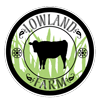Lowland Farm is named for the flat expanse of rich, grassy pastures and fields that slope into lofty hills skirted by the rambling Pochuck Creek. In 2007, the farm was permanently protected under Warwick’s Purchase of Development Rights program.
At Lowland Farm we aim to raise our animals responsibly and to graze our land in a sustainable fashion. — Will Brown and Barbara Felton
Pastured Meats, Naturally Raised
Meats from Lowland Farm come from animals that are humanely raised. Cows and sheep graze pastures and eat hay exclusively, the food that best suits their ruminant stomachs. They range across open pastures from birth to market, rather than live in confinement. this allows them to stay healthy and live free of antibiotics.
Out cows and sheep grow naturally, at nature’s pace, with growth-producing hormones. Grazing on fresh grass in summer and hay in winter, cows and sheep produce beef and lamb that’s pure in grass-fed flavor with all the benefits of natural pasturing.
Lowland Farm cows are mixed breeds of English heritage: primarily Angus, Hereford, and British White crosses. Lowland Farm cows spend their entire lives outdoors, in Lowland Farm’s fields and woods. They graze on pasture summer and, in winter, eat hay harvested from the bottom lands of our farm.
Sheep are “hair” sheep breeds from warm climates that shed their wool naturally: Katahdins, Dorpers, and St. Croix. Sheep graze Lowland’s pastures in summer, spring, and fall. They shelter in barns in winter.
Our History and Mission
Will Brown and Barbara Felton bought the original 200 acre parcel in 1985 as a weekend retreat from their New York City lives. Along with their two sons they watched their neighbor tend his cows on their land, little knowing they would end up as grass farmers themselves.
Land preservation and soil conservation have always been central to Lowland Farm’s mission. Personally, we find watching the interplay between animal life and plant life in the development of pastureland to be exciting.
The management-intensive, sustainable grazing that we do is more of an art than a science and involves a lot of tweaking. There is great satisfaction in mastering this practice and the mysteries it entails.
Moving the Herd
At Lowland Farm, we practice intensive rotational grazing of cattle. This approach maximizes cow health and improves soil by sequestering carbon and nitrogen. The cow herd is moved daily so that grasses are eaten uniformly.

